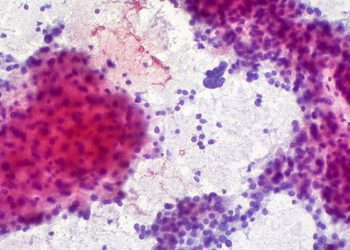Hepatocellular carcinoma screening reduces mortality [Classics Series]
Image: PD
1. Patients at high risk for hepatocellular carcinoma who underwent biannual screening with serum AFP levels and liver ultrasound were much more likely to be diagnosed with cancer in the earlier stages and receive curative treatment.
2. Biannual screening for hepatocellular carcinoma leads to a significant reduction in 5-year mortality.
Original date of publication: July 2004
Study Rundown: Since the 1970’s, it has been common practice to screen for hepatocellular carcinoma (HCC) in high-risk patients with alpha-fetal protein (AFP) levels and ultrasound. However, this trial conducted in China was the first randomized controlled trial to demonstrate a reduction in mortality with biannual combined screening. Compared to the control group, the group who received screening (at least once) during the course of the study was found to have HCC diagnosed at earlier stages than the control group. More subjects in the screening group were able to undergo resectable surgery than in the control group. Five-year survival was 46.4% in the screening group and 0.00% in the control group (chi-square 35.50, P<0.01).
In summary, biannual screening with AFP levels and ultrasound significantly improved survival in patients with hepatitis B virus (HBV) who were found to have HCC. Biannual screening was shown to detect cancers at an earlier stage that allowed for more effective and curative therapy. Of note, the study only included patients with known chronic hepatitis infections. In addition, the majority of the participants was male and under the age of 50. Currently, the HCC screening guidelines do not discriminate by age, but it is important to know that these results may not be as accurate for an older population.
Click to read the study in the Journal of Cancer Research and Clinical Oncology
In-Depth [randomized, controlled study]: This study, published in 2004, was conducted in primary care centers across Shanghai, China from 1993 to 1997. Eligible patients were all patients 35-59 years of age who either had a history of chronic hepatitis or serum evidence of a hepatitis B infection. Patients with a known history of HCC, other malignant diseases, or serious illnesses were excluded. Patients were randomly allocated to a screening or a no screening group. Screening included a biannual serum AFP level and liver ultrasound. A subject’s participation at least once in the screening was required for inclusion in the screening group. The median number of screenings a subject participated in was 5. Serum AFP levels above 20 mcg/L were considered abnormal. Any abnormality found on screening was re-evaluated by screening a 2nd time to reduce false-positives. Patients were followed up for 5 years. The primary end-point was mortality from HCC, with a significant reduction in the screening group (83.2 per 100,000) compared to the no-screening group (131.5 per 100,000 with a rate ratio of 0.63, 95%CI 0.41-0.98). Patients in the screening group were also more likely to be diagnosed with HCC at earlier stages (60.5% were diagnosed with Stage I HCC in the screening group compared to 0.0% in the no-screening group). Forty-six percent of HCC patients in the screening group were able to undergo surgical resection while 50.7% in the no-screening group were treated conservatively. Five-year survival was 46.4% in the screening group and 0.00% in the control group (chi-square 35.50, P<0.01).
By Milana Bogorodskaya and Andrew Cheung, M.D.
© 2013 2minutemedicine.com. All rights reserved. No works may be reproduced without expressed written consent from 2minutemedicine.com. Disclaimer: We present factual information directly from peer reviewed medical journals. No post should be construed as medical advice and is not intended as such by the authors, editors, staff or by 2minutemedicine.com. PLEASE SEE A HEALTHCARE PROVIDER IN YOUR AREA IF YOU SEEK MEDICAL ADVICE OF ANY SORT.




